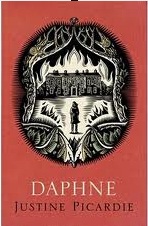My copy of Daphne, by Justine Picardie had been sitting on a stack of unread books for some time looking forlornly at me. ‘Why haven’t you read me yet?’ it reprimanded. ‘Why – when you love Daphne du Maurier so, haven’t you picked me up?’
If I’m honest, even though I was interested to read it, I’m not a huge fan of things biographical. I don’t know why (perhaps I’m allergic to real life!), but even if a person is particularly interesting I rarely want to read a biography. With Discovering Daphne on the horizon, I decided it was about time to give it a go. What I found out is that Daphne is the perfect blend of biography and fiction that suits someone like me.
There are three voices in Daphne. Daphne du Maurier herself, who we meet when she is aged 50 and struggling with her husband’s illness and the collapse of her marriage. Then there is John Alexander Symington, a scholar who Daphne has contacted to help her with her research on a new biography that she is writing about Branwell Brontë, the famous black sheep of the Bronte family. Finally, fast forward to the present day, and our third narrator is a young woman who is writing a PhD thesis on du Maurier and becomes intrigued by Daphne du Maurier’s hunt for the truth about Branwell Brontë and the letters between her and Symington which seem to suggest a literary scandal at the heart of them.
What a thoughtfully planned novel this is. Picardie evidently researched Daphne in great depth in order to create what feels like a faithful representation of her at this stage of life, while keeping a light touch in her writing and avoiding it becoming overworked. She also creates clever little parallels in her novel to the du Maurier’s own work which as a literary device really worked for me as I love spotting references. If I was being very critical, I could say that the parallels are unsubtle – for example, the young PhD student if I remember rightly has no name, just as the second Mrs de Winter in Rebecca, and suffers the same kind of feelings of inadequacy in her marriage. However this style really worked for me and I believe that Picardie is making her own observation that du Maurier’s depiction of the fears and emotions of the second Mrs de Winter are in fact part of a pretty universal experience that most women have encountered at some point in their lives.
I liked that all the characters in the book were doing their own bit of literary detective work, hoping to uncover a mystery or scandal that they could call their own. Perhaps the one conclusion that they all come to is that real-life stories don’t have a neat key to them.
In many ways, Daphne is a book to curl up with, it’s comforting, especially if you are a fan of du Maurier’s books, because there are elements that feel familiar. However, Daphne
is certainly not a frivolous read. Picardie draws out quite a few dark themes around professional jealousy, fear of failure, as well as obsession hinting that Daphne du Maurier suffered from mental health problems, including depression, anxiety and even hallucinations. Symington fights his own emotional issues, and has a temperament which makes him at times detestable and at others, pitiable. It is his feeling of failure that eats him up.
I think it would be remiss of me not to admit that I don’t think Daphne would hold quite as much appeal to people who haven’t read du Maurier’s novels, however I’d like to think that it might inspire those who hadn’t to do so. Picardie’s portrait of du Maurier was to me, utterly convincing, and while in many ways her novel is homage to the author, it is also quite brutal as it explores the darkest corners of her family history. I wonder, if Daphne du Maurier, who used her wonderful skills of observation to expose the deepest corners of her own characters’ souls would have approved?





Pingback: Discovering Daphne – Round Up #1 |
Ooh, I’m glad I read your post as I may try to fit this in this month too as I have a copy on my shelf. The synopsis reminds me slightly of Byatt’s Possession but probably much darker!
It was an interesting book (just had to reread my review – 2 years ago!) I learnt something more about Daphne but at that point I had only read Rebecca. I found the book clever but not an easy read but one that needs to be read, if you are a fan of Daphne just to other views, opinions and ideas.
a great choice for the discovering month ,all the best stu
Pingback: Justine Picardie joins ‘Discovering Daphne’ part 2… | Novel Insights
Pingback: The House on the Strand, by Daphne du Maurier – Discovering Daphne Readalong #3 | Novel Insights